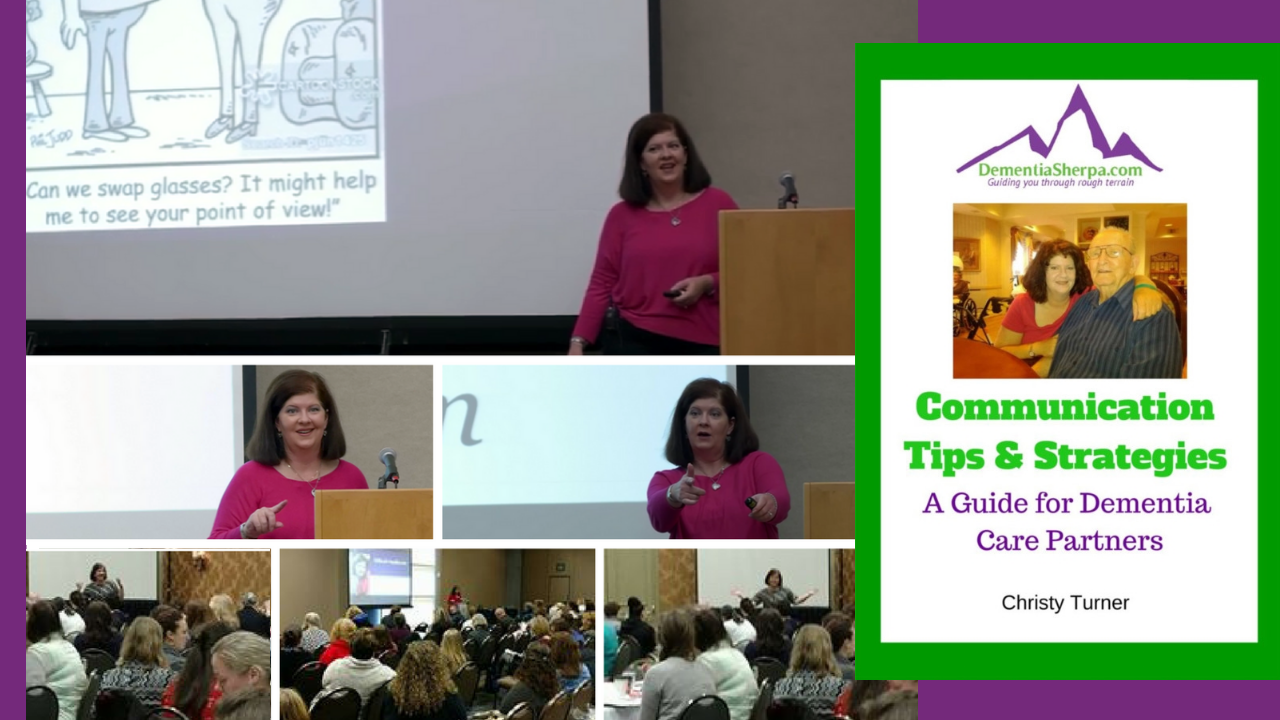The Alzheimer’s Podcast:
Navigating Rough Terrain with the Dementia Sherpa
Hello and welcome to Episode 44 of The Alzheimer’s Podcast – I’m Mike Good of Together in This.
My goal is always to empower you and your family to maintain a positive experience, reduce and eliminate the need for medications, and make your time together with those you care for, the best it can be.
(show notes below)
The podcast is no longer being produced or hosted on podcast platforms. But you can listen to or download the episode by clicking the text below:
Click this text to open a new window where you can play the audio or click the 3 dots to Download
Prefer Video? Watch Here:
Show Notes:
In the last episode, we discussed Is it Time for Memory Care and How Do You Find the Right Place?
In this episode of Navigating Rough Terrain with The Dementia Sherpa, Christy Turner and I continue our conversation on memory care by discussing what is memory care and what should you look for in a quality memory care community?
When I first started learning about Alzheimer’s and dementia, my vision of what memory care is was very distorted from reality. And after researching for this episode and scanning some forums on the internet, I can see that there are a lot of misconceptions out there regarding what memory care is and isn’t.
Christy has run award-winning memory care communities in assisted living and skilled nursing levels of care. Using her expert knowledge she explains what memory care is and what you should look for when you are trying to find the right memory care for your loved one.
She is also a Certified Dementia Practitioner, Certified Dementia Care Unit Manager, and Cognitive Stimulation Instructor.
Using her 16 years of experience in working with over 1,100 people living with dementia and their families, she’s developed a system that helps families move from crisis management to confidence.
Be sure to visit Christy’s website at dementiasherpa.com.
I hope you enjoy this episode.
- TinT resources:
- Independent Living, Assisted Living, and Memory Care: Explained
- 10 Tips for Effective Communication with the Long-Term Care Team
- EP43: Is it Time for Memory Care and How Do You Find the Right Place?
- EP45: How to Make a Successful Move into a Memory Care Community
- EP46: Is Memory Care Inevitable or Can You Do Things to Avoid It?
- Christy’s resources:
- Christy’s articles on TinT:
Please feel free to ask questions or leave a comment below:






Your podcasts are incredibly informative. This one especially. Christy mentioned 2 things that I never hear anyone else talking about that I have been experiencing with my mom and if possible I would like her to speak more about in the future.
The first one is about people needing more sleep. I find that my mom needs more and more sleep and I have not been able to determine why or does this seem to happen at a specific stage of the memory loss process.
The second is that dementia/alzheimers people need 5000 calories a day. Is there a resource that can help us understand how to put together a nutritious weekly food plan that supports this need for those of us taking care of people at home ? Could this lack of calories be contributing to people needing more sleep?
Hi Cindy, I’ve wondered the same thing regarding a nutrition plan so I don’t have an answer for you. This article may help though: https://togetherinthis.com/three-steps-ideal-diet-dementia/
Hi, Cindy 🙂
Thanks for listening! Also appreciate the great questions…both of which are much more easily–and thoroughly–explained in a podcast (I talk faster than I type!). So we’ll take a deeper dive into this on a future episode.
Meantime, the short(ish) answer is that when someone has dementia, their whole brain is under attack. So memory is affected, but also the immune system and balance and and and….Everything! Everything requires more effort (effort=energy). And using more energy requires both more sleep and more calories.
It’s tough to wrap your head around until you start looking at *everything* and realizing the amount of energy it takes. For example, one load of laundry=18 steps from start to finish (the way I do it). Doesn’t seem like a big deal, but when you start breaking down every step, every action, it becomes a big deal. It *feels* like we just magically go from one room to the next, but that actually takes a lot of coordination within the brain, neurons firing as originally designed, sending signals to stand, balance, one foot in front of the other, not get distracted from here to there, etc.
As dementia progresses, day to day life and actions we take for granted becomes more difficult for people to navigate. More energy output=need for more sleep and more calories. So yes, it’s most noticeable as the condition is progressing.
Hope that helps, and I’m looking forward to talking about this more in an upcoming episode.